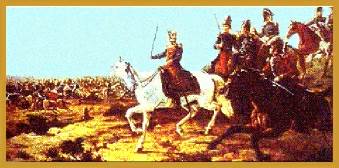|
PinkMonkey Online Study Guide-World History
16.9 Nationalism in Latin America
In Latin America, national feelings grew strong
in the Spanish colonies. This happened because of the unhappy relationship
between the Creoles or the American-born Spaniards and the European
Spaniards.
Miranda, Bolivar and Martin
The first to champion the cause of Latin American freedom was the
Venezuelan Creole, Francisco de Miranda (1750 1816). Owing
to his great activity, a revolutionary congress deposed the governor
and established the independence of Venezuela in 1811.

Exhibit 16.9
Simon Bolivar
The next patriot to lead Latin America to freedom
was Simon Bolivar (1783 1830). He won a decisive victory
against the Spaniards in 1819, and became the President of New Granada
and Venezuela. He lent a helping hand to the people of Ecuador,
Peru and Bolivia. The revolutionaries were successful, and the Spaniards
were driven out by 1825. He was called the Washington of South America.
However the most capable leader of Latin America was San Martin
(1778 1850) who played a great part in liberating Chile and
Peru.
Patriotic movements started in Mexico in 1810,
and Mexico gained independence by 1821. A new era in the relations
between the U.S. and Latin America started during the presidency
of Woodraw Wilson. In March 1913, he declared that one of the chief
objectives of his administration would be to cultivate friendship
and to deserve the confidence of the republics to the South. Wilson
adopted the policy of "watchful waiting" and left Mexico
to the solution of its own problems.
The policy of collaboration and co-operation with
the Latin American states, inaugurated during Wilsonís Presidency,
has been continued by later administrations. President Roosevelt
followed it and termed it the "Good Neighbor" policy.
In 1915, growing collaboration among the American
states expressed its opinions in the meeting of a Pan-American
Financial Conference at Washington and in the conclusion of
an arbitration treaty by Argentina, Chile and Brazil. In 1916, commissions
dealt with the problems of improved telegraph and railway communications
and the elaboration of a uniform commercial law.
A Pan-American Conference of 1923 made provisions
for fact-finding commissions in cases of disputes. This work was
elaborated at a conference in Washington in 1929, and continued
by conferences in 1933, 1936 and 1938.
[next page]
|